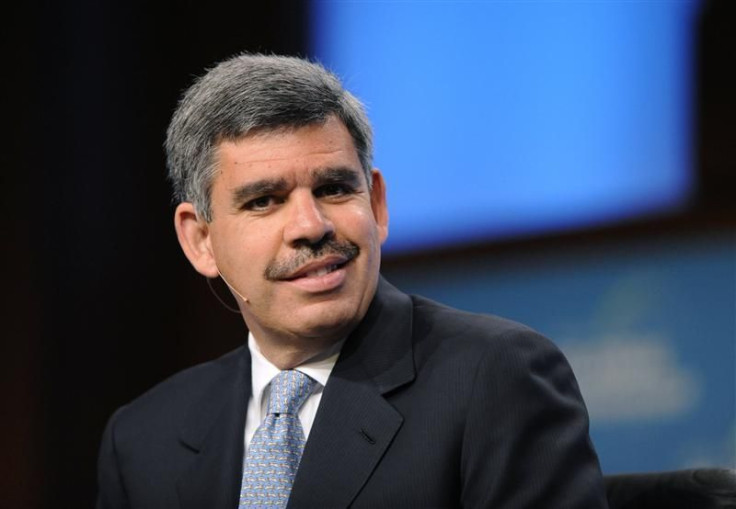El-Erian Is Leaving PIMCO - Now What?

On Tuesday the Pacific Investment Management Company (PIMCO) announced that its chief executive officer and co-chief investment officer, Mohamed El-Erian, will be leaving in March but staying on with parent company Allianz as an advisor.
El-Erian, a respected economic expert, will likely move on to new ventures, as he always has. But a few rising stars will be taking his place at one of the world’s largest bond fund managers – which didn’t have a great year in 2013.
In 2013, investors pulled $47 billion from the $237 billion Pimco Total Return Fund, which dropped 1.9 percent, its first loss since 1999, according to Morningstar. Late in the year, it was overtaken by the Vanguard Total Stock Market Fund as the world’s largest retail fund. As the firm was exposed to fixed income assets more than most large fund management firms, it was "hurt by a shift in investor interest toward equities from fixed income,” Todd Rosenbluth, director of ETF and mutual fund research at S&P Capital IQ, told Marketwatch.
But these problems aren’t necessarily why El-Erian is leaving.
“I think it’s pretty natural for those kind of stumbles to happen, and I doubt that anything in particular can be attributed necessarily to Mohamed,” Eric Jacobson, senior fund analyst at Morningstar, said in a video interview.
It’s also not his first time changing course.
El-Erian was born in New York but grew up in Egypt and often traveled with his father, a diplomat who worked with the United Nations, he wrote in Financial Times.
He studied at Oxford and Cambridge before starting at the International Monetary Fund in 1983, later serving as a managing director at Salomon Smith Barney/Citigroup in London. He joined Pimco in 1999 and left in 2005 to manage Harvard’s endowment fund, but then returned to Pimco in 2007.
In 2008, his book “When Markets Collide: Investment Strategies for the Age of Global Economic Change” became a best-seller.
In 2012, President Obama appointed El-Erian to the President’s Global Development Council, a group that advises on global economic strategy and policy.
Throughout his career he has been well-known for his economic commentary, published by a variety of publications. After the financial crisis, he popularized the idea of a “new normal” to describe the environment of a slowly recovering global economy.
Despite his highly public role in the firm, El-Erian managed only three smaller funds, which all lost money last year. For example, the Pimco Global Advantage strategy fell 2.6 percent in 2013, according to Morningstar.
At Pimco, he was known for championing a switch in focus from bonds to diversified funds, pushing the firm toward stocks, which has been more difficult than expected.
“Being the co-chief investment officer, he’s had a very large impact, I believe, particularly on the macroeconomic calls that have been implemented in probably every other Pimco fund in existence,” said Jacobson.
“It’s really important for us to keep an eye on how the investment committee continues to evolve, what those voices look like, and try to get a handle on whether or not it’s a big enough change to have any concern.”
William Gross, Pimco’s founder and co-chief investment officer, will remain at the helm, overseeing more than $1.9 trillion in assets.
In 2010, he told Bloomberg that he was thinking of the future when he brought El- Erian back on.
“Your most important job, certainly in your 60s, is to plan for your succession,” he said.
“We knew that Mohamed could fill an important part of the puzzle.”
But it looks like he will remain in the post longer than expected -- possibly for quite some time, writing on Twitter that he’s 'ready for another 40 years.'”
However, things will be a little different. Two Pimco money managers will be moving up to become co-deputy chief investment officers after El-Erian departs.
One of them is Andrew Balls, currently a managing director and head of European portfolio management at the company’s London office. He manages eight funds, including the Pimco Global Advantage strategy, which beat 49 percent of its peers over the last three years.
His brother, Ed, is a British politician and member of the British Labour and Co-Operative Party.
“More than once I heard [Andrew] referred to as Ed’s clever brother. He’s a modest, cerebral guy,” Andrew Gowers, a former Financial Times editor who had worked with both brothers, told the Guardian in 2012.
He worked at the Financial Times as an economics correspondent, and joined Pimco in 2006.
The other is Danial Ivascyn, a managing director at Pimco since 2007 who has been a rising star for some time. In 2013, Morningstar named him “Fixed-Income Fund Manager of the Year.”
He co-manages the $29.9 billion Pimco Income Fund, which took in $7.8 billion in new money and was up by 4.8 percent last year – beating more than 82 percent of peers, according to Morningstar.
He used to work with asset-backed securities at Bear Stearns, as well as T.Rowe Price and Fidelity Investments, before joining Pimco in 1998.
Pimco’s chief operating officer, Douglas Hodge, will become its chief executive officer in March.
Hodge led the firm’s Asia Pacific region from Tokyo from 2002-2009, but has been with the firm since 1989.
These are a few who will be moving up thanks to El-Erian’s departure. But for Jacobson, the selection is important for the future of the company.
“Bill Gross has been and remains one of the best managers in the business. He’s also been one of the best at evaluating macroeconomic conditions, if not, as we said before, perfect,” Jacobson said.
“But we want to also have a sense that he will continue to be challenged in his ideas much in the same way that he has been over the year,” he added.
“That’s probably the biggest thing on my radar.”
© Copyright IBTimes 2024. All rights reserved.












